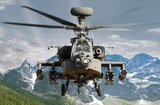Qatar to acquire additional Rafale aircraft
Qatar Emiri Air Force has signed an agreement with Dassault Aviation to acquire an additional 12 Rafale omnirole combat aircraft.
The new aircraft will join the 24 Rafale ordered by Qatar in May 2015.
Thales, a member of the French Rafale team, will provide a range of intelligent electronic systems for the Rafale, including the RBE2 AESA radar, the Spectra electronic warfare system, optronics, the communication, navigation and identification system, cockpit display systems, power generation systems and a logistics support component.
The equipment supports the Rafale's ability to perform different tasks including reconnaissance, air defence and precision strike, in a single mission.
Patrice Caine, CEO of Thales, said: 'Qatar relies on Thales and its skills in connectivity technologies, big data, artificial intelligence and cybersecurity, all of which are central in the contracts that have been announced today.'
Related Equipment in Defence Insight
More from Digital Battlespace
-
![EID to unveil new vehicle communication system at DSEI]()
EID to unveil new vehicle communication system at DSEI
The Portuguese company’s naval communications system is in service across more than a dozen countries. It has turned to its home nation for support in developing a new vehicle based C2 system.
-
![Chess Dynamics successfully demonstrates Vision4ce AI-driven tracker]()
Chess Dynamics successfully demonstrates Vision4ce AI-driven tracker
The Vision4ce Deep Embedded Feature Tracking (DEFT) technology software is designed to process video and images by blending traditional computer vision with artificial intelligence (AI) algorithms to present actionable information from complex environments.
-
![Wave Relay devices cleared for security use on commercial systems in industry trend]()
Wave Relay devices cleared for security use on commercial systems in industry trend
Persistent Systems has been cleared by National Security Agency (NSA) to transmit sensitive data on commercial networks. The devices are added to the NSA’s Commercial Solutions for Classified (CSfC) component list which also includes other companies’ products providing the same security.
-
![UK teases cyber spending boost in Strategic Defence Review ahead of “imminent” release]()
UK teases cyber spending boost in Strategic Defence Review ahead of “imminent” release
The release of the UK’s Strategic Defence Review (SDR) has been long promised as mid-year. It is possible it could be as early as 2 June although the UK Ministry of Defence (MoD) continues to play its cards close to its chest.
-
![Intelsat emphasises SATCOM resilience for SOF in contested domains (video)]()
Intelsat emphasises SATCOM resilience for SOF in contested domains (video)
Intelsat outlines how its multi-orbit SATCOM architecture is enhancing connectivity and resilience for special operations forces operating in degraded and contested environments.
-
![US Space Force’s next-generation missile warning system moves forward with $500 million in new contracts]()
US Space Force’s next-generation missile warning system moves forward with $500 million in new contracts
Next-Generation Overhead Persistent Infrared (Next-Gen OPIR) satellites are intended to provide early warning of missile launches from any location worldwide and new ground stations will result in expanded coverage of critical missile warning.

























